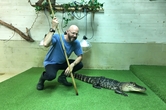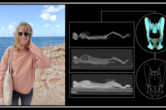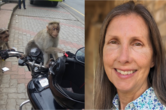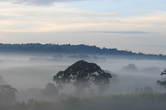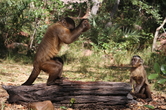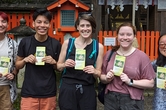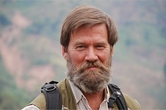The PrimateCast #69: Dr. Takeshi Furuichi on bonobos, Wamba Village in the DRC, and building theories of human behavioral evolution
This is podcast #69 with Dr. Takeshi Furuichi.
I was really excited about this interview. I've known our guest - Dr. Takeshi Furuichi - since I was a grad student in the Section of Social Systems Evolution at Kyoto University's now rebranded Primate Research Institute. He was the Section Head until this year when we were all redistributed together to the Wildlife Research Center.
"I want to behave like ... females of bonobos, but in reality I am a male chimpanzee"
Dr. Furuichi is considered a leading expert in the behavior of bonobos, and has gone to great lengths to better understand how and why they differ from their close cousins, the chimpanzees. He runs the study site at Wamba village, in the Democratic Republic of the Congo, and has continued to shed light on the evolution of the genus Pan and what it means for our own evolutionary story as well.
In the interview, we meander through a lot of interesting topics. We discuss why Japanese primatologists have almost exclusively studied Japanese macaques and African Great Apes. Dr. Furuichi then describes how the small village of Wamba in the middle of the Congo Basin became the setting for one of the most influential bonobo study sites in the world. And the trials and tribulations of those who made that happen!
Then we talk about bonobos and chimpanzees, how they're the same, how they differ, and why. This provides a great summary of his work and should be a great primer on ecology and evolution within the genus Pan. And, he ends with a discussion of how he and his partner, Dr. Chie Hashimoto, are doubling down on uncovering the interrelationships between sex and society.
For anyone listening, it should become apparent early on that Dr. Furuichi is a great storyteller and drops loads of little nuggets of information and wisdom thorughout the interview. I hope you all enjoy listening to this interview as much as I did recording it.
For anyone interested in finding out more about hist work, you can visit Dr. Takeshi Furuichi's profile on the Wildlife Research Center's website. Use a translator where necessary (I recommend DeepL!). I would also encourage you to visit the website for the NGO that Dr. Furuichi spearheaded called Support for Conservation of Bonobos, where you can learn more about bonobos, the jungles and people of Wamba, and the Kyoto University group's efforts to protect them.
I hope you enjoy this interview with Dr. Takeshi Furuichi on The Primatecast. When you're done, you can browse loads of other audio content from primatologists and conservationists from around the world.
You can also visit (and Like/Follow) us on Facebook and Twitter and leave comments and feedback on this or any other podcast in the series.
Follow our RSS feed, or subscribe to the podcast on iTunes to keep up with the latest content.
Consider sending us an email or reaching out on social media to give us your thoughts on this and any other interview in the series. We're always happy to hear from you and hope to continue improving our podcast format based on yur comments and suggestions.
Photo Caption: Takeshi Furuichi with local kids at Wamba Village in the DRC
Photo Courtesy: Takeshi Furuichi
Cover Art: Chris Martin
The PrimateCast Music: Andre Goncalves
Closing Credits: Katherine Majewski
